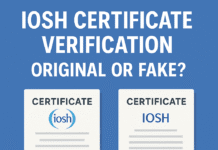
IOSH Safety Manager Qualifications
Safety in the workplace is a top priority for organizations globally. To ensure the highest standards of occupational safety, businesses often rely on professionals with recognized qualifications. One such certification that holds great importance is the IOSH Safety Manager qualification. In this article, we will delve into the various aspects of obtaining and benefiting from the IOSH Safety Manager certification.
I. Introduction
A. Brief Overview of IOSH Safety Manager Qualifications
The IOSH Safety Manager qualification is a globally recognized certification that focuses on developing professionals capable of managing safety in the workplace effectively. It is awarded by the Institution of Occupational Safety and Health (IOSH), a leading organization in the field of occupational safety.
B. Importance of Having a Certified Safety Manager
The role of a certified Safety Manager cannot be overstated. In an era where workplace safety is a legal and moral imperative, having a qualified professional to navigate the complexities of safety regulations is crucial for organizations. The IOSH Safety Manager qualification ensures that individuals possess the knowledge and skills needed to fulfill this vital role.
II. Understanding IOSH
A. What is IOSH?
The Institution of Occupational Safety and Health (IOSH) is a global professional body with a mission to promote a safe and healthy working environment. It provides various certifications and training programs, with the IOSH Safety Manager qualification being one of its flagship offerings.
B. Role of IOSH in Occupational Safety
IOSH plays a pivotal role in setting international standards for occupational safety. The organization collaborates with experts, businesses, and governments to create frameworks that prioritize the well-being of workers across different industries.
C. Importance of IOSH Safety Manager Qualifications
Obtaining IOSH Safety Manager qualifications signifies a commitment to excellence in safety management. It demonstrates an individual’s understanding of the best practices in the field and their ability to implement them effectively in the workplace.
III. Qualifications and Eligibility
A. Educational Requirements
To be eligible for IOSH Safety Manager certification, candidates typically need a relevant educational background, such as a degree in occupational safety or a related field. This ensures a foundational understanding of safety principles.
B. Professional Experience Needed
In addition to education, candidates are required to have practical experience in the field of occupational safety. This ensures that certified Safety Managers have real-world knowledge and insights to handle diverse workplace scenarios.
C. Prerequisites for IOSH Safety Manager Certification
Before embarking on the certification journey, candidates must fulfill certain prerequisites, such as completing specific courses or workshops. These prerequisites lay the groundwork for the comprehensive training that follows.
IV. IOSH Safety Manager Training
A. Overview of the Training Program
The IOSH Safety Manager training program is designed to equip candidates with the knowledge and skills needed to fulfill the responsibilities of a Safety Manager. It covers a wide range of topics, including risk assessment, hazard identification, and emergency planning.
B. Duration and Format of the Training
The training program is structured to accommodate the needs of working professionals. It is often available in flexible formats, such as online courses and workshops. The duration varies but is generally designed to be completed within a reasonable timeframe.
C. Subjects Covered in the Training
Candidates can expect to delve into subjects such as legal requirements for workplace safety, best practices in risk management, and the implementation of safety policies. The training is comprehensive, ensuring that Safety Managers are well-rounded in their knowledge and skills.
V. IOSH Safety Manager Exam
A. Details about the Examination
The IOSH Safety Manager exam is the culmination of the training program. It assesses candidates on their understanding of safety concepts, their ability to apply these concepts in practical scenarios, and their knowledge of relevant regulations.
B. Passing Criteria
To achieve certification, candidates must meet the passing criteria set by IOSH. This ensures that certified Safety Managers have a demonstrated level of proficiency in all key areas covered during the training.
C. Preparation Tips for the Exam
Preparing for the IOSH Safety Manager exam requires dedication and focus. Candidates are advised to review course materials thoroughly, engage in practical exercises, and seek additional resources to enhance their understanding.
VI. Benefits of IOSH Safety Manager Qualifications
A. Career Advancement Opportunities
Individuals with IOSH Safety Manager qualifications often find themselves in high demand across various industries. The certification opens doors to career advancement opportunities, including promotions and leadership roles in safety management.
B. Enhanced Job Prospects
Employers prioritize candidates with recognized certifications, and IOSH Safety Manager is among the most respected in the field. Possessing this qualification significantly enhances job prospects, making individuals more competitive in the job market.
C. Contribution to Workplace Safety
Certified Safety Managers play a crucial role in creating and maintaining a safe work environment. By obtaining IOSH Safety Manager qualifications, professionals contribute to the overall safety culture of their organizations, fostering a sense of well-being among colleagues.
IOSH, or the Institution of Occupational Safety and Health, is a globally recognized professional body that offers various qualifications related to occupational safety and health. One notable qualification is the "IOSH Safety for Managers" course.The IOSH Safety for Managers course is designed to provide managers and supervisors with the essential knowledge and skills to effectively manage health and safety within their teams and organizations. The key objectives of this qualification include:Understanding Responsibilities: Participants learn about their legal and moral responsibilities regarding health and safety in the workplace.
Risk Assessment: The course covers the principles of risk assessment and how to identify, assess, and control workplace hazards.
Hazard Identification: Managers are trained to recognize and manage different types of hazards, including physical, chemical, ergonomic, and psychosocial hazards.
Accident Investigation: The qualification includes guidance on investigating accidents and incidents, understanding root causes, and implementing preventive measures.
Emergency Preparedness: Managers gain insights into planning for emergencies, ensuring effective responses to incidents, and safeguarding employees.
Communication: The course emphasizes the importance of effective communication in promoting a positive safety culture within the organization.
Legislation and Compliance: Participants learn about relevant health and safety legislation and how to ensure compliance within the workplace.
Continuous Improvement: The qualification encourages a proactive approach to health and safety management, promoting continuous improvement in policies and practices.
Upon successful completion of the IOSH Safety for Managers course, participants receive a certificate that attests to their understanding of key safety principles. This qualification is suitable for individuals in managerial or supervisory roles across various industries.It's important to note that IOSH offers other qualifications as well, catering to different levels of expertise and roles within the field of occupational safety and health. Individuals can choose the most appropriate qualification based on their responsibilities and the level of expertise required.VII. Real-life Impact of IOSH Safety Managers
A. Case Studies of Successful Safety Managers
Examining real-life case studies provides insight into the impact that certified Safety Managers can have on workplace safety. These stories highlight successful interventions, risk mitigations, and positive changes brought about by professionals with IOSH qualifications.
B. Positive Impact on Workplace Safety
Companies that invest in certified Safety Managers experience a noticeable improvement in workplace safety metrics. Reduced accidents, better emergency response, and increased employee awareness are some of the positive outcomes associated with IOSH-certified professionals.
C. Testimonials from Certified Professionals
Gathering testimonials from individuals who have completed the IOSH Safety Manager certification adds a personal touch to the narrative. These testimonials can provide prospective candidates with firsthand accounts of the value and impact of the certification on their careers.
VIII. Common Misconceptions
A. Debunking Myths about IOSH Safety Manager Qualifications
Addressing common misconceptions surrounding the certification is essential for potential candidates. By dispelling myths, individuals can make informed decisions about pursuing IOSH Safety Manager qualifications without being hindered by unfounded concerns.
B. Clarifying Misconceptions Surrounding the Certification
Misconceptions may arise regarding the difficulty of the training, the relevance of the certification in specific industries, or the career opportunities it presents. Clearing up these misunderstandings ensures that candidates approach the certification process with accurate expectations.
IX. Comparison with Other Safety Certifications
A. Contrasting IOSH Safety Manager with Other Certifications
While there are several safety certifications available, IOSH Safety Manager stands out for its comprehensive approach and global recognition. Contrasting it with other certifications helps individuals understand why it is a preferred choice in the field.
B. Why IOSH Stands Out
The reputation of IOSH and the thoroughness of its training program set it apart. Employers recognize the value of IOSH Safety Manager qualifications, making it a wise investment for professionals seeking to establish themselves in the safety management domain.
C. Advantages of Choosing IOSH Safety Manager Qualifications
Highlighting the specific advantages of choosing IOSH Safety Manager qualifications over other certifications provides clarity for individuals weighing their options. Factors such as industry acceptance, curriculum comprehensiveness, and global recognition contribute to its appeal.
X. How to Maintain the Certification
A. Continuing Professional Development (CPD) Requirements
Maintaining IOSH Safety Manager certification involves participating in ongoing professional development activities. IOSH requires certified individuals to stay updated on industry trends and continually enhance their skills through CPD.
B. Renewal Process for IOSH Safety Manager Certification
Certification renewal is a standard process that ensures professionals remain current in their knowledge and skills. IOSH outlines a straightforward renewal process, which typically involves completing a set number of CPD hours and paying a renewal fee.
C. Importance of Staying Updated in the Field
The field of occupational safety is dynamic, with regulations and best practices evolving. Staying updated is not only a requirement for certification renewal but also crucial for Safety Managers to effectively address emerging challenges in the workplace.
IOSH Scholarship for Safety Professionals
IOSH Safety Manager: 50 Duties Of A IOSH Safety Manager
IOSH Safety Engineer: 50 Duties Of A IOSH Safety Engineer
IOSH Safety Officer: 50 Duties Of A IOSH Safety Officer
How to Check IOSH Accreditation
XI. Conclusion
A. Recap of the Importance of IOSH Safety Manager Qualifications
In conclusion, the article recaps the key points regarding the significance of IOSH Safety Manager qualifications in ensuring workplace safety. It reinforces the idea that certified Safety Managers are pivotal in creating and maintaining safe working environments.
B. Encouragement for Individuals to Pursue Certification
The conclusion serves as an encouragement for individuals to consider pursuing IOSH Safety Manager certification. It emphasizes the potential benefits for their careers, the positive impact on workplace safety, and the contributions they can make to their organizations.
XII. FAQs
A. What are the Prerequisites for IOSH Safety Manager Certification?
The prerequisites for IOSH Safety Manager certification typically include a relevant educational background, professional experience, and completion of specified courses or workshops.
B. How Long Does It Take to Complete the IOSH Safety Manager Training?
The duration of IOSH Safety Manager training varies but is designed to be completed within a reasonable timeframe. Factors such as the format of the training (online or workshops) and individual learning pace contribute to the duration.
C. Can I Take the IOSH Safety Manager Exam Online?
Yes, IOSH often provides the option to take the Safety Manager exam online. This flexibility accommodates the needs of working professionals and those with scheduling constraints.
D. Is the Certification Globally Recognized?
Yes, IOSH Safety Manager certification is globally recognized. It is respected across industries and geographical boundaries, making it a valuable credential for professionals worldwide.
E. What Are the Renewal Requirements for IOSH Safety Manager Certification?
Renewal requirements typically include completing a set number of Continuing Professional Development (CPD) hours and paying a renewal fee. This process ensures that certified Safety Managers stay updated and maintain their proficiency.





















